Long Lane Farm Ends Growing Season with Annual Pumpkin Fest, Fall Harvest
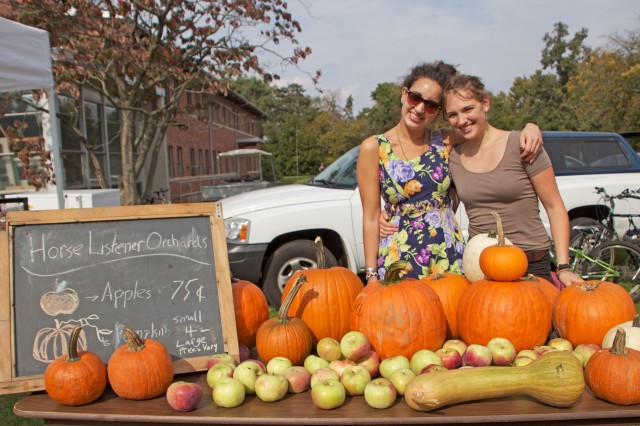
It’s that time of year: crunchy fall leaves and the long awaited end to the summer harvesting season. Long Lane Farm’s ninth annual Pumpkin Fest, held on Oct. 6, celebrated this culmination with free vegetarian food, face painting, live music from student bands, farm tours, yoga, and more.
Middletown residents and Wesleyan students and faculty alike came together in what farm enthusiast Josh Krugman ’14 called “a celebration of the farm as a student-run project that makes amazing things happen, and also the farm as a community and the possibility the farm has of creating community even outside of the school with the people of Middletown.”
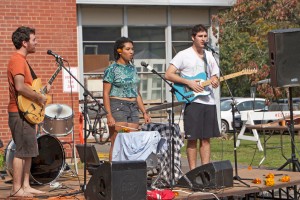
Jiving to the music of Northpaw, Brushfire, Featherwood, and other student bands, participants relaxed in the sunshine and visited the various booths that embodied similar causes to that of Long Lane Farm. Students’ bicycles were hooked up to generate a small portion of the energy needed for the musical performances; even Arrow, the Ronnybrook cow, showed up for the occasion to promote the all-natural local milk that Wesleyan drinks in its dining halls. Vendors sold baked goods, smoothies, and of course, pumpkins, along with free veggie burgers and apple cider.
The farm began in 2002 as a student initiative to promote sustainable farming and to provide an educational space to do so. That first season Long Lane supplied 50 Middletown residents with summer produce, and positive results have been growing upwards from there. This past season, six students stayed over the summer vacation, harvesting and cultivating the farm’s crops, which included tomatoes, eggplants, squash, peppers, potatoes, melons, and more.
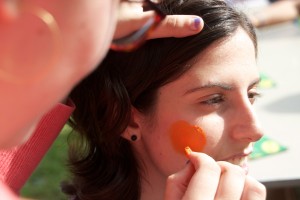
These vegetables are then distributed to three recipient groups. The first and largest consumer is Wesleyan’s dining service, Bon Appétit, which paid for a third of the summer labor, and is now paying for all of the labor for the school year. This partnership allows for greens and other produce straight from Long Lane Farm to fill up the salad bar bins and disperse throughout everyday meals at Usdan and other cafeterias for all Wesleyan students to enjoy.
Another portion is sold at farmers’ markets both on and off campus, including the North End Farmers’ Market throughout the summer.
“North End has a few grants that allow them to double all the money that people get from food stamps and other federal assistance programs. So, if they have a three dollar check, they can get six dollars worth of vegetables,” Krugman explains. This program promotes healthy eating in low-income households of Middletown. What is not sold to Bon Appétit or at farmers markets is donated to the Amazing Grace Food Pantry in Middletown.
Though this productivity is a great reward for all the hard labor put in, ultimately, “This is Wesleyan land, an educational space where we try to counter top down, hierarchical structures with broadest possible base of knowledge,” says Krugman. Reflecting this notion, Long Lane Farm’s organizational structure is completely horizontal. Of the 30 or so students who frequent the farm, 12 people meet once a week to discuss what needs to be done, though the meetings are always open if others want to join.
A weekly email is also sent out that gives the schedule of paid workers, allowing for newcomers and people who just want to occasionally drop in to learn from the more experienced.
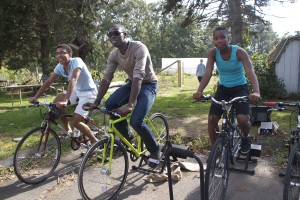
As the farm hits its 10-year mark, plans for the future are under consideration. With regards to expansion, the grassy open space surrounding the existing farmland could possibly hold a large cornfield or something else completely. The goal, however, is to keep the balance between productivity and education, engaging as many people as possible in the project.
Currently, both faculty and members of the Middletown community have their own individual plant boxes on the outskirts of the land, but the plan is to start to integrate them into the rest of the farm. Not only will this serve as security for their harvests, it would also allow more people to join the educational side of the project.
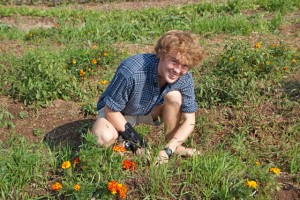
“We want to keep being what we are, which is a place where people can come, meet other interesting people, and learn about a whole variety of lifestyles having to do with the earth, and in the process grow beautiful, beautiful food,” says Krugman.
Workdays are every Saturday from 10-2, open to anybody interested in working, or just to see what goes on.

